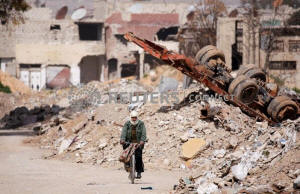|
Long recovery ahead in former Syria rebel
enclave eastern Ghouta
 Send a link to a friend
Send a link to a friend
 [March 13, 2019]
EASTERN GHOUTA, Syria (Reuters) -
Hunkered near one of Syria's hottest front lines for seven years, the
eastern Ghouta district of Ein Terma sustained more damage than most
areas in the conflict. [March 13, 2019]
EASTERN GHOUTA, Syria (Reuters) -
Hunkered near one of Syria's hottest front lines for seven years, the
eastern Ghouta district of Ein Terma sustained more damage than most
areas in the conflict.
Its markets are now full and children throng the streets where shells
were falling a year ago. But for the people who have returned to live
there, the recovery is gradual.
As the eighth anniversary of the civil war arrives this week, Ein
Terma's battered streets attest to the long road ahead for Syria's
war-smashed towns and cities.
Many inhabitants have lost neighbors, friends or relatives as the
population scattered through years of conflict. Despite government work,
rubble still clogs many streets and the water and electricity supply is
only partial.
Jobs are scarce, and for people who stayed in the area when it was
controlled by the rebels, family paperwork for births and deaths in that
period must be done anew.

Samiha Fares and her five children left their home in 2012, early in the
war, as rebels gained control over the district.
She had been working for the Ein Terma municipal government and the
rebels threatened her children and installed rockets on the roof of her
house, she said.
The family quickly moved to Jormana, a district located just across the
front line from their old home in Ein Terma. When government forces
recaptured the area at the end of March last year, Fares returned with
her children.
Their house was empty and scorched by fire. "My children calmed me. At
least our house was still there and we could live in it," she said. She
found an old carpet and mattresses and blankets to sleep on. But the
financial situation was difficult.
President Bashar al-Assad's forces retook eastern Ghouta during a fierce
offensive under massive bombardment.
As the rebels surrendered, people who did not want to come back under
government control left to opposition-held Idlib in Syria's far
northwest.
According to the United Nations commission of inquiry on Syria, up to
50,000 people were "evacuated" in this way to the northwest.
The Syrian war, which has killed hundreds of thousands of people, has
driven around half of Syria's pre-war population from their homes, 5.7
million of them living as refugees in neighboring countries.
HARDSHIP
Fares' own income went on necessities for the family. During the
fighting, she pulled her oldest son out of university so he could
contribute, working to help pay the rent.
[to top of second column]
|

A man rides on a bike past rubble in Ein Terma, a district of
eastern Ghouta, Syria February 26, 2019. Picture taken February 26,
2019. REUTERS/Omar Sanadiki

She was divorced so they had no other adult income and she renovated
their war-damaged house with money paid as compensation to her
daughter from a car accident.
But the once tight-knit neighborhood has changed. "I don't know any
of the neighbors. They're all strangers. They all came from
somewhere else, from other villages," said Fares. Their relationship
is limited to superficial greetings, she said.
However, the upstairs neighbor came back to see the house and may
now renovate it and return there. "Everybody is waiting for the
summer to come back," Fares said hopefully.
Hisham al-Zaqawi is also finding things difficult. He was a jeweler
and confectioner before the war, and he stayed in Ein Terma
throughout the fighting when it was under rebel control.
He says he distrusted the opposition, but when the army retook
eastern Ghouta, his two brothers chose not to come back under
government control and joined the exodus to Idlib.
During the years of siege, food became so expensive that he had to
sell his business and even his own wife's jewelry. There are more
job opportunities now, he said, but he struggles for work.
His two older children were born before or early in the crisis, but
his three-year old daughter Sham must be registered with the
government. The procedure is straightforward, but the fee is
expensive, he said.
"Currently I don't have a good job. I'm sitting without one. If
there was a job in renovating or anything like that I wouldn't say
no. I'd work."
(Reporting by Kinda Makieh in eastern Ghouta; Writing by Angus
McDowall and Imad Creidi)
[© 2019 Thomson Reuters. All rights
reserved.]
Copyright 2019 Reuters. All rights reserved. This material may not be published,
broadcast, rewritten or redistributed.
Thompson Reuters is solely responsible for this content.
 |